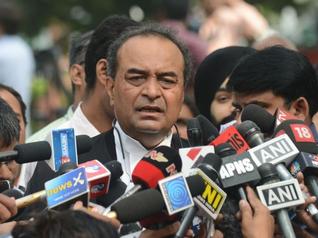New Delhi, Oct 30: Following the Supreme Court’s directive on Tuesday, Attorney General Mukul Rohatgi on Wednesday submitted to the court in a sealed envelope, a list of 627 names of persons with foreign accounts along with a status report regarding the investigation conducted against them and .
 Mr. Rohatgi told the court said the investigation into the income tax violations would be completed by March 31, 2015. Some people had accepted that they had accounts in foreign banks and paid tax, the A-G added.
Mr. Rohatgi told the court said the investigation into the income tax violations would be completed by March 31, 2015. Some people had accepted that they had accounts in foreign banks and paid tax, the A-G added.
He said the Centre was not interested in protecting anyone and would follow the court's orders. Mr. Rohatgi said India is to sign a treaty for automatic exchange of financial account information under which the government will be able to obtain detailed information from financial institutions in their respective countries and also exchange them automatically with other nations on an annual basis.
Mr. Rohatgi said India also has to sign the Foreign Account Tax Compliance Act with the U.S. government by December 31, 2014. The law would enable the U.S. government to supply data on Indians in the U.S. and vice versa.
“If India fails to keep the confidentiality clause, the U.S. will back out of such a treaty. Without the treaty, the U.S. will slap a 30 per cent withholding tax on all remittances from the U.S, including exports,” he said.
Earlier Mr. Rohatgi submitted that the first list submitted to the Court contained details of correspondence, treaties and agreements that India had signed with France and other nations where the illegal money was said to be stashed. He said the second list contained all the 627 names and the third gave the status report on the probe in these cases.
Mr. Rohatgi said more than half the people in the list of 627 were Indian nationals while the rest were NRIs. He said most of them had accounts with the HSBC Bank, Geneva.
The A-G said the details of account holders with entries up to 2006 were supplied by the French government to the Centre in 2011. The data was stolen from the HSBC Bank in Geneva, which later reached France from where the government got the information, he said.
When the CJI asked the A-G if the government was pressing for modification of the court's orders, Mr. Rohatgi replied in the negative but said the government should be allowed to approach the SIT in this regard.
The Bench asked the SIT to submit a status report on the probe it conducted by November 30 and posted the matter for further hearing on December 3.






Comments
Add new comment